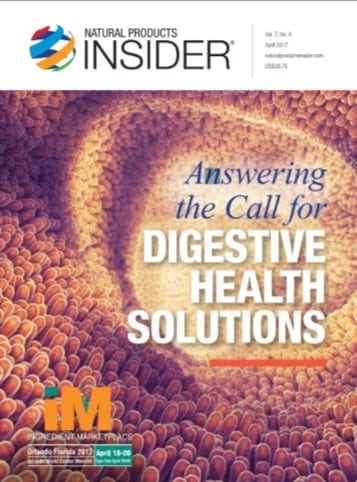
Answering the Call for Digestive Health Solutions
Whether supporting gut health with probiotics and fiber, or battling gastrointestinal disorders via enzymes or botanical formulations, the digestive health market continues to thrive—particularly for products showcasing natural ingredients.
Probiotics from Breast Milk Counteract Gut Health Problems
INSIDER’s Take
- The health of the microbiota of the gut, which is influenced greatly by probiotics in the diet, affects many aspects of human health.
- Probiotics found in breast milk have been shown to improve the digestive health of infants as well as other demographics.
- Breast milk probiotics also demonstrate an antioxidant ability and anti-inflammatory properties to benefit the gut.
The intestinal microbiota is a bacterial community composed of a wide variety of microorganisms.
This bacterial community has coexisted with the human for millions of years, reaching a degree of adaptation and interrelation in which many functions of the human organism are influenced by the microbiota. In fact, this interrelation is so important that it is said the microbiota is one more organ of the human organism.
At the end of the 19th century, Louis Pasteur, aware of the role of microorganism in human health, predicted that an animal’s existence would be impossible without microbial life. Today, we know that life is possible in the absence of this microbiota, but the functions of the organism are seriously affected. Experiments have shown intestinal function, metabolic functions, immune response and even brain function are some of the functions influenced by the intestinal microbiota.
The qualitative and quantitative composition of the microbiota plays a determining role in an individual’s health. Changes in its composition, name dysbiosis, may lead to alterations or diseases. Constipation, intestinal inflammatory diseases, allergies, obesity, etc., have been related with certain microbiota patterns. Major external factors influencing microbiota are diet and antibiotic treatments.
With respect to diet, studies of intestinal microbiota characterization comparing populations with different diets show how certain food habits can affect the microbiota and certain functions of the organism. For example, certain diets promote a microbial profile that is more efficient in the food energy exchange process and encourages fat accumulation. On the other hand, the restriction in the consumption of fermented foods in diet modifies the microbiota and affects parameters related to the immune response.
Type of feeding is also especially relevant in the colonization of infants. Formula-fed infants show important differences in their fecal microbiota compared to breastfed, which might be related to lower incidence of infections and metabolic diseases, better cognitive development, etc. In fact, mothers modulate the process of infant colonization thanks to the presence in human milk of prebiotic factors and the mother’s own bacteria, which are transferred to the baby through breastfeeding.
The common use of the antibiotics and new habits including diets with low fiber, high-fat and simple sugar content might alter normal balance of microbiota promoting the development of functional alterations or diseases. To prevent or counteract these health problems, the use of probiotics and prebiotics as efficient strategies for the maintenance of a balanced microbiota is being promoted.
Among probiotic strategies, the use of probiotics naturally found in breast milk is especially interesting. Some of these microorganisms, which contribute to initiate the correct colonization of infant intestine, have been isolated and characterized showing a high probiotic potential. This is the case of Lactobacillus fermentum CECT57 16 Lc40, a strain originally isolated from breast milk, with high antibacterial and immunomodulatory potential. The beneficial effect of this strain has been demonstrated in several clinical tests among hundreds of children.
These studies show how the consumption of this strain reduces the incidence of infectious diarrhea by more than 40 percent. This anti-infective activity is probably related to the antibacterial effect of this strain against several enteropathogenic species, as well as to its demonstrated immunostimulating effect in a healthy population after a vaccination.
At the intestinal level, this strain of human milk origin also shows important abilities for the maintenance of intestinal health. Thus, L. fermentum CE T5716 Lc40 showed a potent anti-inflammatory effect in animal models of intestinal inflammation probably related not only to its immunomodulatory effect but also to the ability of this strain to produce glutathione, the natural antioxidant pare excellence.
Continuing with the strategy of using strains from breast milk origin, Lactobacillus gasseri CECT5714, a strain isolated from breast milk, in combination with a strain from goat milk, Lactobacillus coryniformis CECT5711, induced changes in water content of the feces, stool volume and frequency of bowel movement, evidencing the capability of this probiotic combination to improve the intestinal function.
This effect might be related to an increase in the production of short chain fatty acids (SCFA). These metabolites, produced by microbiota activity, are the main energy source for colonocytes and contribute to several gut functions including carbohydrate and lipid metabolism, control of the colonic pH, maintenance of the integrity of the colonic mucosa, intestinal motility or absorption. Interestingly, it has also been observed that an increase in the fecal bulk dilutes carcinogens, mutagens and tumor promoters, and results in a lower risk of colon cancer, while a faster transit can reduce exposure of the gut mucosa to the potential cancer-inducing agents that may be found among the intestinal content. In addition, the presence of butyrate is usually linked to the anti-neoplastic activities such as increased apoptosis, lower proliferation rate or down regulation of angiogenesis. Therefore, the maintenance of butyrate concentrations in the colon may be considered as a potential health-promoting factor because of its potential role in the prevention of colon cancer.
The modulation of intestinal microbiota by probiotics is an efficient strategy to prevent diseases and alterations of the gastrointestinal tract. Probiotics originally isolated from breast milk are an excellent alternative to take advantage of the strains naturally transferred from mothers to influence the colonization of their infants.






